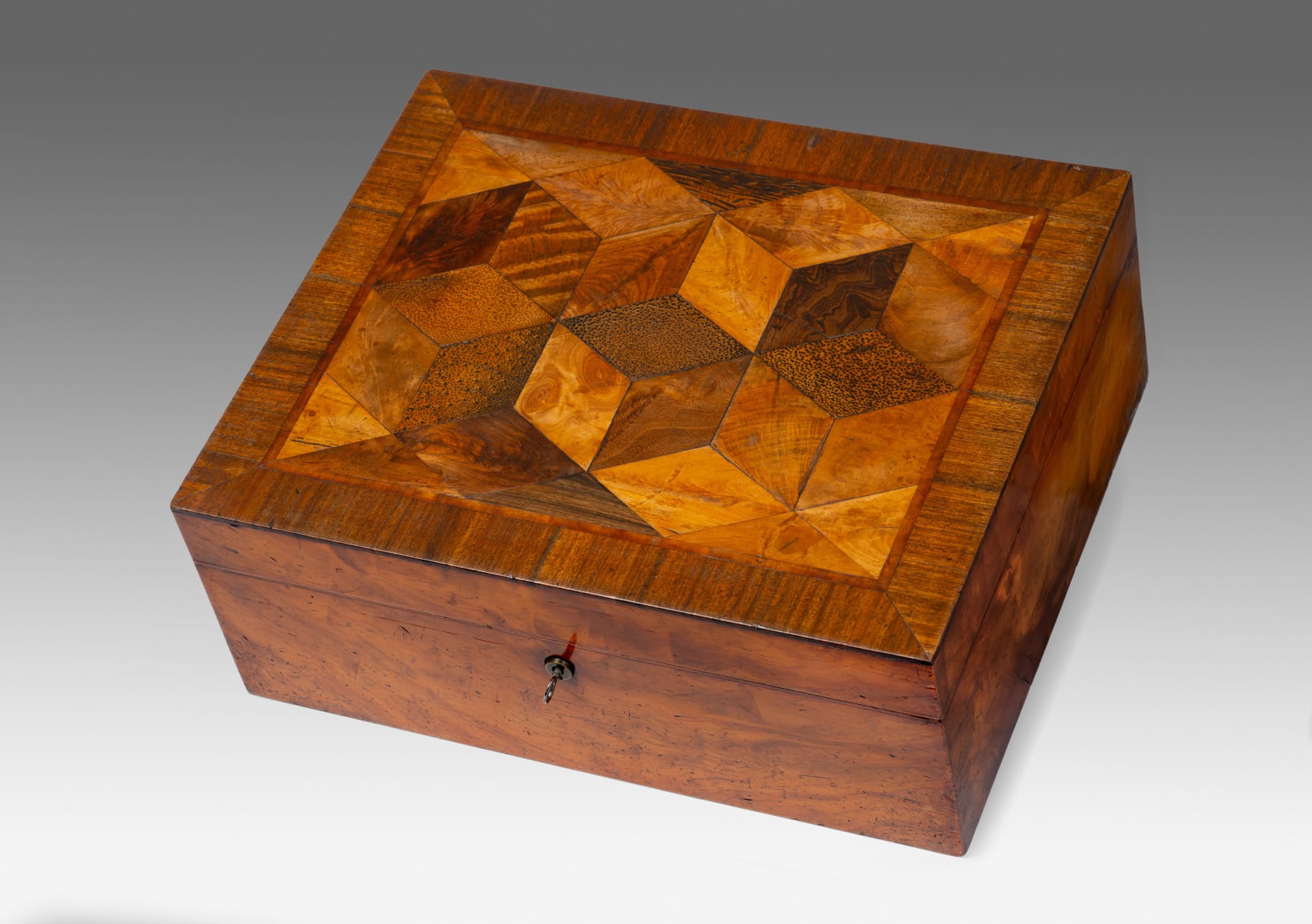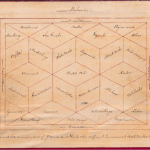 A similar larger box sold by Thomas Coulborn & Sons
A similar larger box sold by Thomas Coulborn & Sons
 Detail of a similar larger box sold by Thomas Coulborn & Sons
Detail of a similar larger box sold by Thomas Coulborn & Sons
 Detail of a similar larger box sold by Thomas Coulborn & Sons
Detail of a similar larger box sold by Thomas Coulborn & Sons
Ralph Turnbull (b. Scotland 1788 - d. Jamaica 1865)
4 x 10 ½ x 8 ½ in
Further images
-
(View a larger image of thumbnail 1
)

-
(View a larger image of thumbnail 2
)

-
(View a larger image of thumbnail 3
)

-
(View a larger image of thumbnail 4
)

-
(View a larger image of thumbnail 5
)

-
(View a larger image of thumbnail 6
)

-
(View a larger image of thumbnail 7
)

-
(View a larger image of thumbnail 8
)

-
(View a larger image of thumbnail 9
)

-
(View a larger image of thumbnail 10
)

Provenance
Private Collection, ScotlandThe lid with geometric parquetry veneers of exotic timbers and crossbanded in rosewood, the front with a lock (with key), opening to reveal an interior lift-out tray fitted with sewing tools in carved mother of pearl and bone, lined with red silk, the underside of the tray with a handwritten paper key to the woods used in the top and the inscription: ‘Key to a work box manufactured of yacca and thirty other different Jamaican woods by Ralph Turnbull How. Kin. Jam. 1840.’ Trade label on the underside.
The handwritten key indicates the woods used in the top of this box are as follows:
Mahoe - Hibiscus elatus.
Fiddlewood - Citharexylum spinosum
Fustic - Maclura tinctoria
Braziletta - Haematoxylum brasiletto
Pigeon Wood - Hedy Carya arborea?
Gynep (guinep) - Melicoccus bijugatus
Naseberry - Manilkara zapota
Sea Grape - Coccoloba uvifera
Olive - Olea europaea
Coffee – Coffea (there are over 130 species)
Black ebony - Diospyros malabarica
White torch - Burseraceae
Logwood - Haematoxylum campechianum
Black torch - Burseraceae
Wild mahogany - Swietenia mahagoni
Coconut – Cocos nucifera
Prickly pole - Bactris plumeriana
Date - Phoenix dactylifera
Redwood - Sequoia sempervirens
Green candlewood – Dracaena
Yellow sanders - (Satinwood) - Zanthoxylum flavum Vahl.
Calabash - Crescentia cujete
Lignum vitae - Guaiacum
Tamarind - Tamarindus indica
Wild cabbage - Brassica oleracea
Zebra - Microberlinia brazzavillensis
Green ebony - Jacaranda obtusifolia
Wild orange - Citrus × aurantium L.
Grey sanders - Terminalia tetraphylla
Yacca - Podocarpus purdieans Hook.
A very similar box by Turnbull bearing the maker's label and containing a hand-inscribed drawing cataloguing the woods used (in the same script as the labels on lids of this box) was sold at Christie’s London, 26th October, 2010 (lot 124).
Thomas Coulborn and Sons sold another box with handwritten labels by Turnbull to the Victoria and Albert Museum and an important 19th Century Jamaican Inlaid Centre Table by Ralph Turnbull to the Museum of Fine Arts, Boston.
Ralph Turnbull (b.1788 - d.1865) was the most recognised and important of all the furniture makers of the nineteenth century in Jamaica. He created a style that combined adaptations of British designs with the use of exotic indigenous timbers to dramatic effect. Turnbull was probably of Scottish birth, as he practiced as a Scottish Methodist. Where in Scotland he was born and anything else of his early life remains unknown. It is certain he arrived in Kingston, Jamaica in 1815 and set up a furniture business with his brothers, Thomas and Cuthbert. By the mid 1820s he was working alone (it appears the brothers had fallen out) and Ralph continued on his own until the 1830s when he worked with his brother, Thomas, again. In 1834/5 Ralph’s eldest son joined the business and later in 1844, when Ralph's youngest son, Robert came of age he too joined his father, brother and uncle in the family business. Tragically, in the same year, 1844, Ralph Turnbull senior lost both his sons. The company name remained the same, ‘Ralph Turnbull and Sons’, until 1 January, 1852 when Ralph changed the company name to ‘Turnbull and Lee’. William Lee was Ralph Turnbull’s son-in-law by marriage to his daughter, Isabel. By 1852 Turnbull was 64 years old and a very old man, even more so by Jamaican life expectancy standards. Ralph Turnbull died in Kingston, Jamaica in 1865 at the age of 77.
We are grateful to Dr John Cross for his research on Ralph Turnbull.







